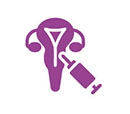IUI
Intrauterine Insemination (IUI) is a simple fertility procedure in which processed (concentrated and washed) sperms are placed inside a woman’s uterus during the period of ovulation, in order to increase her chances of becoming pregnant. The principle behind IUI is that a large number of sperms reach the egg in the fallopian tubes, increasing the likelihood of fertilization. Pregnancy can then follow naturally inside the body.

Who Needs IUI?
| Males |
|---|
| Low volume of semen |
| Low sperm count |
| Ejaculatory failure |
| Retrograde Ejaculation |
| Reduced sperm motility |
| Increase no. of abnormal sperm |
| Female |
|---|
| Ovulatory dysfunction |
| Minimal to mild endometriosis |
| Female anti sperm antibodies (cervical mucus) |
| Thick cervical mucus |
| Unexplained infertility |
Steps of IUI
- IUI can be done in a natural cycle or a stimulated cycle (where medications are used for ovulation).
- Ovulation Induction starts from day 2 of the cycle. Where only tablets (Ovulation induction drugs) for 5 days, followed by hormone injection for 4-5 days which may or may not be required.
- Follicular monitoring- For natural cycles the follicular monitoring starts from day 9 or day 10 of the cycle whereas in stimulated cycles the monitoring begins from day 2 of the cycle. Scans are done to monitor follicle growth. Total of 3-4 ultrasounds are required. Once the size of the follicle reaches 18-22mm a trigger injection is given.
- Trigger Injection- Trigger Injection causes the follicle or follicles to rupture and release the egg.
- Scan- it is done for the confirmation of follicle rupture after 36-38 hours.
- Sperm Collection and Insemination- A washed and healthy semen sample by the andrologist in the IUI lab is used to inseminate in the uterus of the women.
- Pregnancy Test- Beta HCG test (which is a confirmatory test for pregnancy) is performed after 14 days to confirm the pregnancy.
Cases where IUI cannot be done
One or both tubes blocked (Fallopian tube blockage)
- Genital tract infection
- Unexplained genital tract bleeding
- Tubal pathology
- Genetic abnormalities
- Pelvic mass
- Pelvic surgeries
- Severe illness in one or both partners
- Recent Chemotherapy and Radiotherapy
Success rate of IUI
IUI success rate is up to 20% per cycle. We advise at least minimum of 3-4 cycles to be taken before other options like IVF is considered
The results of IUI depends upon several factors:-
- Age of both partners
- Duration of infertility
- Causes of infertility
- Sperm parameters
- Treatment cycle rank (first, second or third cycle)
What do we expect from you?
A healthy life style which will include work life balance and nutritious diet, and in place an exercise schedule. Harmony between mind, body and soul to alleviate stress which will go a long way in coping up with the treatment and increasing the success rates. For men, we advise to refrain from ejaculation 2-3 days prior to the procedure. It helps improving the sperm quality on the day of IUI thereby, increasing the chances of conception.
Frequently asked questions
Q1. What is IUI?
Ans- Intrauterine Insemination (IUI) is a basic fertility technique in which processed (concentrated and washed) sperms are implanted into a woman’s uterus during ovulation to boost her chances of becoming pregnant.
Q2. Is IUI different from IVF treatment?
Ans- Fertilization (meeting of egg and sperm) occurs in the body during IUI (fallopian tubes). IVF, on the other hand, is carried out in a laboratory
Q3. What is the success rate of IUI?
Ans- The success rate of IUI is approximately 20%

